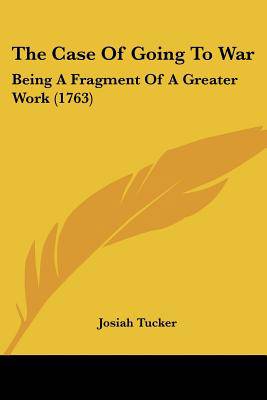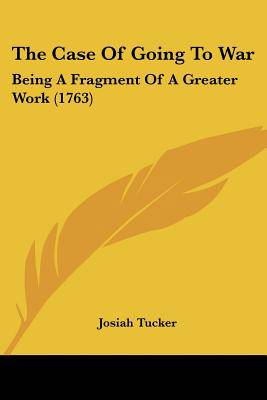
- Retrait gratuit dans votre magasin Club
- 7.000.000 titres dans notre catalogue
- Payer en toute sécurité
- Toujours un magasin près de chez vous
- Retrait gratuit dans votre magasin Club
- 7.000.0000 titres dans notre catalogue
- Payer en toute sécurité
- Toujours un magasin près de chez vous
The Case Of Going To War
Being A Fragment Of A Greater Work (1763)
Josiah Tucker
Livre broché | Anglais
25,95 €
+ 51 points
Description
The Case of Going to War: Being a Fragment of a Greater Work is a book written by Josiah Tucker in 1763. The book is a political treatise that argues against the idea of going to war. Tucker was a British economist and political philosopher who believed that war was a costly and unnecessary endeavor that did more harm than good. In the book, Tucker presents a case against war by examining the economic and social costs of conflict. He argues that war is a drain on resources and that the money spent on it could be better used to improve the lives of citizens. He also suggests that war leads to social disruption and undermines the stability of society. The book is written in a clear and concise style, making it accessible to a wide audience. It is divided into chapters that cover different aspects of the case against war, including the economic, social, and political consequences of conflict. Overall, The Case of Going to War is a thought-provoking and insightful work that challenges the idea that war is a necessary or desirable means of achieving political goals. It remains relevant today as nations continue to grapple with the question of when and how to use military force.This scarce antiquarian book is a facsimile reprint of the old original and may contain some imperfections such as library marks and notations. Because we believe this work is culturally important, we have made it available as part of our commitment for protecting, preserving, and promoting the world's literature in affordable, high quality, modern editions, that are true to their original work.
Spécifications
Parties prenantes
- Auteur(s) :
- Editeur:
Contenu
- Nombre de pages :
- 58
- Langue:
- Anglais
Caractéristiques
- EAN:
- 9781104909406
- Date de parution :
- 10-08-09
- Format:
- Livre broché
- Format numérique:
- Trade paperback (VS)
- Dimensions :
- 152 mm x 229 mm
- Poids :
- 90 g

Les avis
Nous publions uniquement les avis qui respectent les conditions requises. Consultez nos conditions pour les avis.






